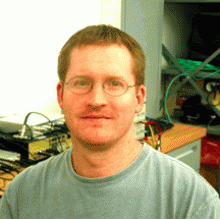MAE Seminar: Advances in CVG Resonator Modeling and Offset Compensation

Mechanical and Aerospace Engineering
Samueli School of Engineering and Applied Science
UCLA
Abstract: Axisymmetric Coriolis vibratory gyros are built around resonators that have multiple pairs of modes that can be configured for sensing. This presentation discusses recent advances in modeling these pairs from transient data. The models provide very accurate estimates of modal frequencies, damping and mode shapes, all of which are needed for the “tuning” algorithms developed by the author for planar axisymmetric resonators. Furthermore, a novel rate offset compensation scheme that exploits the simultaneous operation of multiple pairs of modes in the same resonator is introduced, and it is shown how the effects of offset instability can be delayed by appropriately fusing the two real-time rate measurements.
Bio: Robert M’Closkey received his doctorate in 1995 from the Department of Mechanical Engineering, California Institute of Technology, where he studied driftless nonlinear control systems. He joined the Mechanical and Aerospace Engineering Department at UCLA after a half-year visiting position at UC Berkeley’s Mechanical Engineering Department. He received the NSF Career Award in 1999 and has several teaching awards from UCLA’s School of Engineering. His research interests include the study of the dynamics and control of jets-in-crossflow and a long term commitment to the development of Coriolis vibratory gyro technology.
Share
Upcoming Events
-
EECS 294 Seminar: Programming Light Diffraction for Information Processing and Computational Imaging
-
MAE 298 SEMINAR: Stretchable Electronics for Soft Biological and Robotic Systems
-
CBE Distinguished Lecture/CBE 298 Seminar: Computational Design of Peptides as Detectors, Sensors and Drugs
-
MSE 298 Seminar: Molecular Modeling in the Age of AI - From Energy Materials to Device Simulations
-
CBE 298 Seminar: Metal Electrodeposition for Modern Mineral Refining
